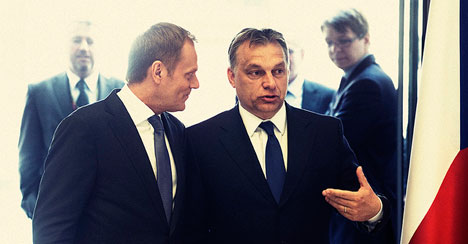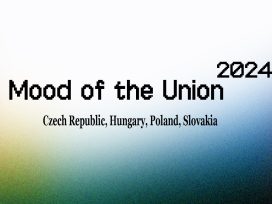
For a strong start into the second season, we talk about corruption in the EU. In the basement of the European Parliament we talk Italian mafia, Orbán’s son-in-law, and the misuse of public funding in member states with MEPs.
Central Europe no longer exists, only East and West, as it used to be. That is the condensed version of the combined wisdom of many western analysts and commentators these days, writes Erik Tabery, editor-in-chief of the Czech weekly “Respekt”. From a Czech perspective, Tabery is certainly concerned for his country’s neighbours. But he also wonders why the West is quite so alarmed at what is happening in the East.
Hungary and Poland – and Slovakia to a lesser degree – have discovered the magic of the conservative, authoritarian state and are moving to restrict the independence of the media and the judiciary.

Former Polish prime minister and current president of the European Council Donald Tusk with Hungarian prime minister Viktor Orbán in Brussels, 2012. Photo: Maciej Smiarowski/KPRM. Source:Flickr
Even though our neighbours’ situation is far from black and white, still, after many years the Czech Republic once again confronts the question: where do we belong?
A glance into western media makes far from pleasant reading for people in our region. At times it seems as though we never belonged to the free world – according to our friends to the West – and that the last 25 years were nothing more than an anomaly, a strange pause while we gave freedom a try.
Now we yearn to return to what the essayist and dissident Milan Simecka, just before the fall of communism, termed “that comfortable unfreedom where those in power know how to stop time and maintain stasis”.
Are we really condemned never to learn how to live freely, as some in the West believe? Have the Hungarians and now the Poles too gone down the road to totalitarianism?
And why are these westerners so upset, when the French came close to electing Marine Le Pen and when various flavours of extremists are on the rise in many countries? Are we being held to a double standard?
The fact remains that Hungary has become an authoritarian state where the leading political party does not throw its opponents into prison, yet has set up the rules and the state apparatus such that the entire country is controlled by one political force.
Although the possibility of change through elections remains, control over the justice system, plus the financial power of the ruling politicians, leaves the opposition almost no chance to succeed at the ballot box. Which was where it all began, when one party won a large majority in parliament.
And it’s happening all over again in Poland. First an outright majority in the legislature and then within hours, parliament changes the laws on the independence of the media and the judiciary to put the government out of reach of the public and state institutions.
Which brings us to back to the question of why the West is so frightened at what is happening in the East.
Every country knows that the next election may see someone elected who half the population will be ashamed of. That is why national and European politicians so rarely comment on elections in other countries.
We have our own experience of this: hardly anyone abroad spoke up when the extreme anti-European Vaclav Klaus (pictured) was elected president in 2003, just as no one mentioned Andrej Babis’ unprecedented conflicts of interest.
Behind the scenes you will hear mutterings, naturally, but no one talks about these things out loud. Such affairs are a matter for each country and everything might change at the next elections.
It’s a completely different matter, though, when the election victors start rewriting the rules so they can stay in power forever.
Any country that hopes to become a member of the European Union must fulfil a number of criteria. More than simply economic data, it is above all about systematic change.
A candidate country must possess all the qualities of a democratic society: an independent judiciary and media, guarantees of human rights, a pluralistic voting system, among others.
We all – the Poles, the Hungarians and us Czechs – knew what we were getting into. That is why Poland’s surprise at the European Commission’s inquiry into the quality of its democracy is totally unconvincing.
The Union’s rules are not supposed to disparage or add a burden to the work of elected government; they are meant to guarantee the citizenry that the democratic process will be upheld.
It would be quite a different matter if Poland were to give voters a choice at a referendum: do you agree with these changes to the system under certain conditions? The ruling Law and Justice party, however, did not promise a cultural and political revolution.
The European institutions are faced with a difficult task. How to let Poland know that rules must be followed without shoving the country into a corner?
European Parliament chairman Martin Schulz certainly did not make a good choice when he announced, “What is happening in Poland has the character of a coup d’etat and is dramatic.”
Even if that were true, the head of an important institution shouldn’t have said it. Nor did the Financial Times‘ normally excellent commentator Wolfgang Muenchau make a happy choice of words when he wrote in Der Spiegel, “I myself believe that the EU’s eastward expansion was, in hindsight, a great mistake.”
Even if we join those who are ladling out criticism of the current Polish government, it must be said that over the past eight years the Poles did a workhorse job in the Union – often on our behalf. Has all that been forgotten so soon?
What is happening in Warsaw is big trouble. And as we see, it’s affecting Czechs too, because almost overnight we found ourselves again listed in the “Eastern Europe” column.
Part of the reason could be the almost complete silence in the other three Visegrad Four states on developments in our neighbour. It makes it seem as if we see these kinds of practices as normal. This is a mistake as regards our relations with the West and the East alike.
Those Poles who support liberal democracy should know that they have a partner in us at a time when they are confronting pressure from their own government – they need to know we share their worry that freedom is under threat.
On the other hand, the Polish government should be made to know that the conflict is not about West vs. East but about the liberal democratic process vs. an authoritarian regime. And that to talk of Nazi undertones in Germany’s criticism of the new media laws only makes them look foolish.
The Polish situation also creates an opening for our diplomacy to at last accomplish something for Europe. As a rule the Germans, the French, or the British resolve all the big crises for us, but here is an opportunity to play our own hand.
Czechs and Poles have excellent relations and we would hardly be suspected of backhanded dealings if we were to find a clever way to let the government in Warsaw know it is going down the wrong road.
If nothing else, at least we can tell it straight to the government: we won’t go there with you. After all, we have our own unfortunate experience from the days of the “opposition agreement” in 1998, when Vaclav Klaus and Milos Zeman also tried to keep themselves in power indefinitely by changing the rules.
For the Czech Republic, the salad days have passed and we need to project a very active foreign policy. But we must face up to difficult questions.
1) European history shows that most major changes in our region result from turning points in the affairs of Germany, which today is our closest ally. How then can we help Germany deal with the refugee crisis, in our own interest?
2) Moscow is an ever more aggressive player in the region. History shows that no sooner does a power take a bite of foreign ground, it wants more. How do we strengthen our defences and convince Europe to do the same?
3) Of the Visegrad Four, three exhibit a dramatic rise of nationalism, xenophobia and authoritarian tendencies. How can we show our western partners that we do not belong to this clique and what can we do to ameliorate the situation in the East?
4) The upcoming referendum on EU membership could see Britain vote to leave the union. What can we do to stop this from happening, because a unified continent needs Britain’s intellectual, business and even military capacity? If we don’t succeed, what then?
Published 28 January 2016
Original in Czech
Translated by
Respekt
First published by Respekt 3/2016
© Erik Tabery / Respekt / Eurozine
PDF/PRINTSubscribe to know what’s worth thinking about.

For a strong start into the second season, we talk about corruption in the EU. In the basement of the European Parliament we talk Italian mafia, Orbán’s son-in-law, and the misuse of public funding in member states with MEPs.

Since the war in Ukraine, the Visegrád Four group no longer articulates a common voice in the EU. Even the illiberal alliance between Hungary and Poland has come to an end. Yet in various ways, the region still demonstrates to Europe the consequences of the loss of the political centre.